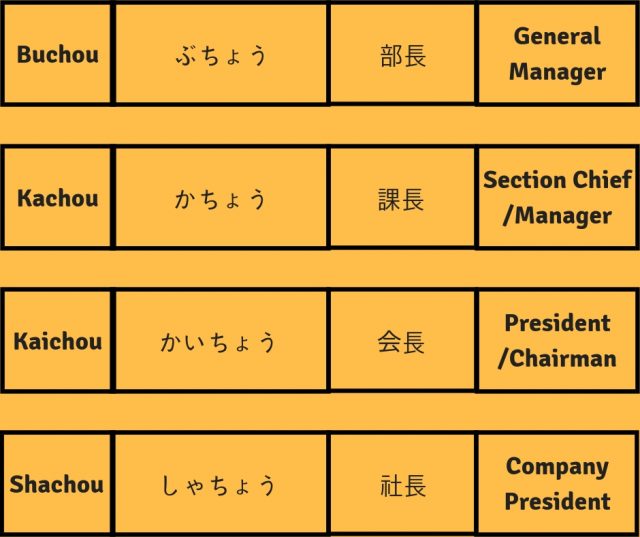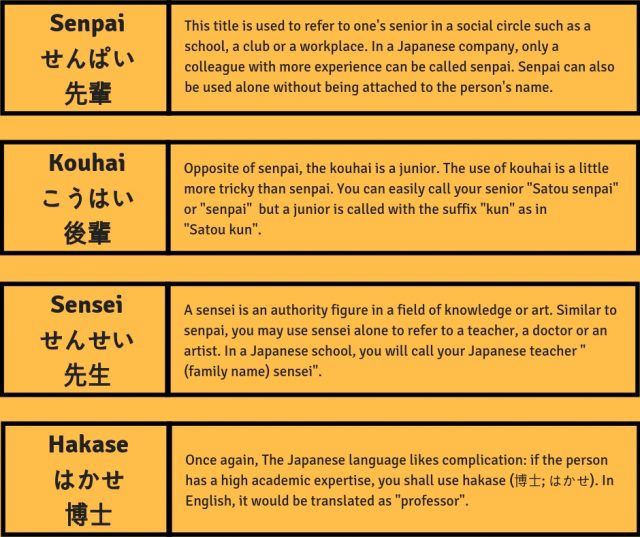What Does Chan Mean in Japanese After a Name
What Does Chan Mean in Japanese After a Name
Japanese Honorific Titles: San, Sama, Kun and Chan

Click Here to join our 30 day challenge to learn Hiragana
Looking for part-time Japanese classes? Check out our Part-time Japanese lessons in Tokyo.
Contents:
- Using Japanese Honorific Titles (E.g. San, Sama, Kun and Chan)
- San (さん), Sama (さま), Kun (くん) and Chan (ちゃん)
- Concept of 呼び捨て (Yobisute)
- Other Japanese Honorific Titles
If you have heard san, sama, kun and chan before, then you know that in Japan, you just simply do not call people by their names! Or you would be very rude. Indeed, to address someone or speak about someone, you need to use the "Japanese honorific title". To navigate Japanese society smoothly, you should better understand how important it is to properly use them. Let's classify the most frequently used honorific titles such as san, sama, kun and chan…
Using Japanese Honorific Titles (E.g. San, Sama, Kun and Chan)
In Japan, most of the time people call each other by their family name rather than their given names. A Japanese honorific title is a suffix that goes after the person's name as in "Satou (name) san (honorific)" to raise this person up.
In doubt, better stay safe and go with the person's family name. You will use the suffix when referring to your interlocutor or to someone else in your conversation. As you may know, Japanese society values hierarchy and someone of higher status may drop the honorific title.
San, the most common one, could be translated as "Mr.", "Mrs." and "Ms." and is gender neutral. However, you will find that Japanese honorific titles are more complicated to use than it looks and that they cannot be so easily translated.
Japanese Honorifics In the Workplace
Beware of the Japanese working environment! In traditional Japanese companies and workplaces, instead of honorific titles, Japanese workers can be addressed by their work titles. Instead of saying Tanaka san", you would say "Tanaka shacho" to speak about your company president. Check out our Business Japanese Courses if you are interested in learning business Japanese!

Workplace Honorifics
San (さん)
San is certainly the first honorific title you will learn when studying Japanese or going to Japan. The usage of san is very wide: the suffix can be added to a person's characteristic and entities such as a company. For example, a baker could be called by "pan ya san" (literally Mr bread shop).
Sama (さま)
Sama is the respectful version of san, mostly used in business and clientele context. This is since the implied superiority of the guest or customer is very strong. When you send a letter, the recipient's name will be followed by the kanji "様". In order to address a group of persons or an audience with respect, sama is attached to "mina" (everyone). This title is also a part of several set of phrases such as "ostukaresama" or "omachidou sama".You easily understand why the Japanese deities are referred to as "kami sama". Formal Japanese can be confusing and complex, please take a look at our guide on Japanese Keigo ( Formal Japanese) to learn the proper way of speaking in formal Japanese
Kun (くん)
The informal kun (君) is strictly reserved to young men or juniors although, in a business context, young women can be called "kun" by their superior. Once again, you should always keep in mind the implied hierarchy of a title. Kun is used by a person of a higher status towards a younger male or a child. Friends can also refer to each other by kun in a casual context and women can use it to address a man to whom they are very close.
Chan (ちゃん)
Chan, the childish version of san, refers to children and girls. The change from "s" sound to "ch" is considered cute in Japanese. Like for kun, friends and lovers can also address each other with this honorific. Surprisingly, there are some strange and wonderful exception to chan, as it can be used to refer to an endearing adult. Among the most famous examples, you will find Arnold Schwarzenegger, called Shuwa chan. Fun fact! Chan is also frequently used to refer to cute animals and in particular, cats!
One common mistake Japanese learners make is referring to themselves with an honorific title. Remember to never use san or any other title to refer to yourself unless you want to sound arrogant! The only exception to the rule is chan: in a casual context, some people, in particular, women, will refer to themselves in a childish third person.
Concept of 呼び捨て (Yobisute)
Yobisute (呼び捨て) is the act of dropping the suffix when you refer to someone else. As it shows a degree intimacy, it is important to take a peek into the Japanese concept of "in-out" (uchi / soto) ruling the whole Japanese speech.
- In Japanese, "uchi" means home. As a concept, "uchi" refers to all the people you know inside a specific social circle: your family, your company, your club. For example, inside the "uchi", family members may drop the title.
- In Japanese, "soto" means outside. As a concept, "soto" refers to all the people who are not inside your specific social circle. For example, another company's employee.
Japanese speech differs depending on the social context of your interlocutor. Foreigners most often struggle to grasp the honorific speech and the profoundly complex politeness of Japanese language. An important and simple rule is that you will not speak the same way with someone from "uchi" to someone from "soto". Regarding the honorific title, the tricky conversation context would be when your interlocutor is from soto and you are referring to someone from "uchi":
- You are talking with a client about your manager, Mr. Kaneki. In your office, you usually refer to your chief as Kaneki san. But in this context, you will drop the honorific title and use the work title: buchou no Kaneki. If you are talking about a colleague, for example, Takezawa san, you will use the word colleague instead of the honorific san: douryou no Takezawa. Note that in such situation, the work title should come first and be attached with the particule "no" to the name.
Other Japanese Honorific Titles
Are there other Japanese honorific titles?
By now, you must have guessed there is quite a long list of honorific titles. The most famous ones are definitely senpai, kouhai and sensei.

Japanese honorific – Senpai Kouhai Sensei Hakase
Other titles exist, such as "bou" (坊) for very young boys and the formal "shi" (氏) most exclusively used by writing and in particular for legal and academic documents. Historically, samouraï and lords were respected with the title dono read as "tono" (殿) but nowadays, you may encounter this title only in official documents and certificates. If you enjoy learning about Japanese history, you might also have heard "chichi ue" or "haha ue" to speak about one's father (chichi) or mother (haha) with a high level of respect: 上 (ue) meaning above.
As for Foreigners…
What about foreigners?
Very often, foreigners feel confused and surprised to hear people addressing others with their family name. Japanese are not always at ease when addressing a foreigner but they know the connection implied by the use of the first name abroad. Do not be surprised if "san" is added to your first name instead of your family name. And do not feel offended if they omit the "san" as some Japanese might attempt to respect westerner manners.
On the contrary, the use of the first name is considered too familiar for Japanese and they would feel rather uncomfortable. That being said, the more you spend time in Japan or close to Japanese, the more you will understand exceptions exist, in particular with Japanese who have experience with foreigners.
In business contexts, it is necessary to use keigo with colleagues of higher positions and seniority. Find out more here.
You can also learn about the different ways to refer to yourself here
Let's watch a video to recap on what you have learned
Latest Animated Version is here!
Looking to learn more Fun & Easy Japanese? – please read Nihongo Fun & Easy – written by Teachers from Coto Japanese Academy

If you are interested in studying Japanese in Tokyo, find out more about our school by filling out the form below.
Post Views: 260
Related Articles
Source: https://cotoacademy.com/san-sama-kun-and-chan/
Posted by: fairfaxhagerre.blogspot.com
0 Response to "What Does Chan Mean in Japanese After a Name"
Post a Comment